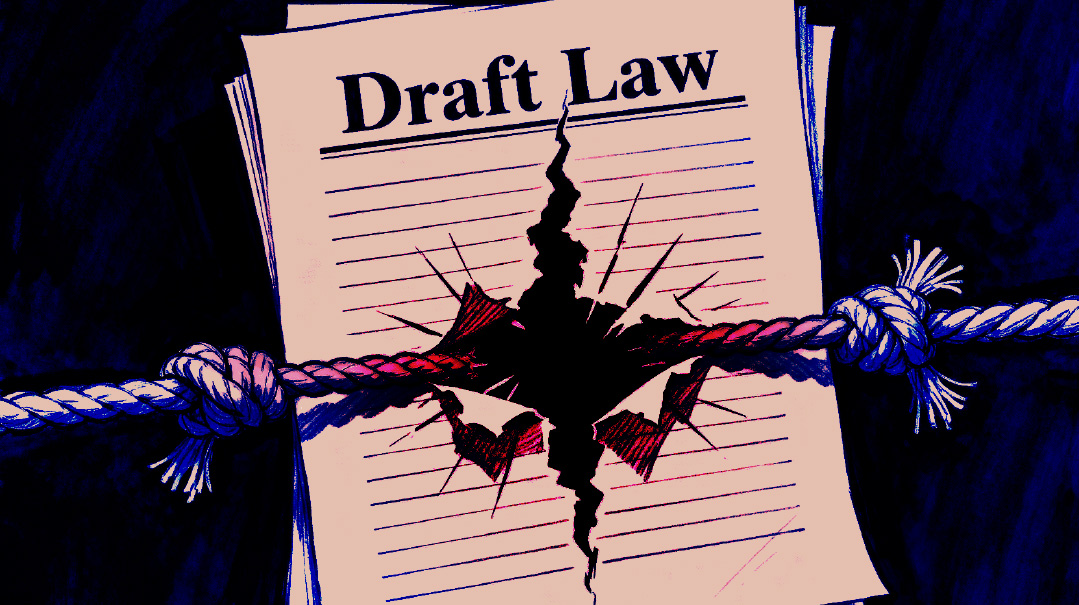The Hot Seat

Coronavirus has shown the limitations of remote journalism, and none more so than when covering the Knesset

Although there are downsides to being part of the much-derided Fake News Media, in an Israeli lockdown there are definitely perks. Members of the Fourth Estate get to travel freely up and down the country speaking truth to power, and generally avoiding the claustrophobia of being kept within a 1,000-meter radius of home.
But perks apart, coronavirus has shown the limitations of remote journalism, and none more so than when covering the Knesset. Since the onset of COVID, access to Israel’s parliament has been severely restricted, with MKs able to issue only four passes daily. The last time yours truly was there, the building was almost deserted, lawmakers had masks over their chins, and operations were down to essentials.
None is more vital than the Plexiglas-divided Law and Constitution Committee room — the parliamentary body that has emerged as a check on government power as Israel battles a second wave. A half hour spent there recently, and a post–Yom Tov conversation with its chairman, Degel HaTorah politician Yaakov Asher, showed the complexity of the country’s battle with coronavirus. Here are some takeaways:
There Are No Easy Answers
How much lockdown is too much with corona? Judging by the star-studded list of lawbreakers — including a Likud minister, an opposition MK, the head of the Shin Bet, and the army’s chief of staff (and myself) — the reality is that from the top of society to the bottom, the rules are being ignored.
At the vocal post-Succos Law and Constitution Committee meeting, those rules came under attack from former justice minister Ayelet Shaked, now an opposition MK.
“Stop ignoring the reality,” she said, “the rules are stupid. Is someone from this government going to take responsibility and say that there won’t be enforcement of weddings of 20 people more than a kilometer from home? If no one will change the rule, I’ll tell every couple caught getting married in this way to send the policeman to me.”
Professor Hagai Levine, a senior Israeli doctor called to the committee, backed up Shaked in more measured style by saying that the “paternalistic strategy” of micromanaging citizens’ lives was a waste of time. “My fear is the public doesn’t believe anything the government says and won’t keep even the basic rules.”
But the reality is more complicated, as some of the assembled politicians out for a headline well know. “The 1,000-meter limit is not for the purpose of education,” responded Itamar Grotto, deputy director-general of the Health Ministry. “But it’s the only way to stop lots of events and gatherings without getting bogged down in the detail.”
It’s a balance that has bedeviled right-wing governments everywhere. Politicians who officially believe in small government have presided over an unprecedented expansion of executive power. Asher has found himself wrestling with police excess at the same time as approving a second national lockdown.
“The obsession with catching people not wearing masks outside has to end, and the police need to focus on stopping people breaking quarantine,” he said. “But at the same time, the lockdown worked, and we see the steep decline in infection rates.”
The Chareidim Are Insider-Outsiders
Sitting at the head of the massive oval committee room table, Yaakov Asher looks like a man in control. The former Bnei Brak mayor’s authoritative, radio-presenter voice doesn’t particularly need a microphone, but he has one anyway. But commanding presence or not, Asher — and the rest of the chareidi politicians — are outsiders as much as insiders.
When I ask what will prevent this second reopening from descending into a farce like the first round, Asher’s answer is revealing. “It depends if the government has a better plan,” he says. “Slower opening, better ways of dealing with violations.”
What’s remarkable is not the lack of detail — Asher hasn’t yet seen the latest plan — but the tone of a senior member of the coalition. Despite the fact that Shas leader Aryeh Deri is in the Corona Cabinet, and Asher and other chareidi MKs sit at critical junctures in the parliamentary machinery, they remain — and are often see as — outsiders. The “government” is not them.
Political Deadlock
Toward the end of that pre-Rosh Hashanah committee session, MK Eli Avidar of Avigdor Lieberman’s Yisrael Beiteinu party sought to relieve his boredom and find out who was his new neighbor (me) at the oval table.
“Tell me, why do the chareidim stay with Netanyahu,” he wanted to know, “when they can get the same things from the opposition?”
A few months later, with the polls showing Likud down from 40 to 26 seats, and Naftali Bennett’s Yamina soaring from five to 23, I ask Yaakov Asher the same thing: Is the young right-winger a potential prime minister, and would the chareidi parties sit under him knowing that he was in cahoots with Yair Lapid in 2013?
“Bennett said sorry for what he did with Lapid, and we’d definitely sit with him,” Asher answers. “But it’s very early to look at polls and start measuring out suits. On the one hand, people are suffering with corona, and they see that this government can’t continue as it is. On the other hand, both Likud and Benny Gantz’s Blue and White Party are so far down that they can’t afford elections.”
Ending his political analysis with a typically learned flourish, the chareidi politician says, “It’s oy li miyitzri, oy li miyotzri.”
Only in the Knesset
Cleaning out my memory bank of recent Knesset moments, the following occurred to me. Back in the summer, I interviewed Degel HaTorah MK Yitzchok Pindrus for Mishpacha.com outside the Knesset. As the cameraman set up his equipment, a protester in the Rose Gardens opposite took notice. Presumably latching onto the fact that it was a frum politician being interviewed by a frum journalist, the demonstrator started to sing in a high, American-accented voice: “Beat swords to ploughshares, lo yisa goy el goy cherev, stop selling weapons to authoritarian countries.”
And so it went on, round and round, the length of the interview (you can hear him in the background). At the time it was annoying and amusing.
But as Israel makes peace with one after another more or less savory Arab regimes — deals greased by Israeli technology used by these regimes to spy on their citizens — the question that this man posed has stayed with me.
Is realpolitik a Torah-based foreign-policy?
(Originally featured in Mishpacha, Issue 831)
Oops! We could not locate your form.







Comments (1)